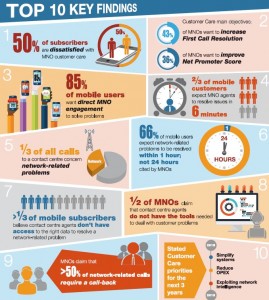Latest research from MobileSquared on behalf of Astellia, the leading provider of network and subscriber intelligence for Mobile Network Operators (MNOs), has revealed that almost 50% of mobile subscribers are unhappy with the level of customer service they receive from their mobile operators. When liaising with them about a customer service issue, 48.5% of people surveyed believe they have had a less-than satisfactory engagement with their mobile operator.
66% of subscribers expect a network-related problem to be resolved within 1 hour. Only 28% of consumers are prepared to wait up to 24 hours. This contrasts starkly with the findings from the MNOs themselves, the majority of whom believe their customers will wait up to 1 day for network problems to be resolved, and a further 26% expecting their customers will wait up to 3 days. This is despite the fact that the MNOs themselves also admit that more than 50% of network-related calls are not resolved on the first attempt and require an additional call-back.
Perhaps unsurprisingly, 43% of mobile operator respondents believe that an improved customer experience will be achieved through the ability to increase their first call resolution (FCR). However, unfortunately for them more than one-third of mobile customers state that their MNO did not have access to the relevant information when dealing with their network-related problem during the call, such as customer usage, location details, network data, and quality of experience. Half of MNOs themselves also believe that their contact centres do not have the prerequisite tools to deal with customer problems.
The research also found that only 27% of mobile users would be classified as a Promoter of their MNO according to Net Promoter Scores (NPS), 30% would be Passive, and 43% would be termed as Detractors. Amazingly, not one MNO respondent believed their customers would rate their satisfaction as a Promoter. 36% of MNOs therefore cite improved NPS as a clear ambition; increasing the percentage of Promoters and migrating Detractors into Passives with a long term aim of becoming Promoters. To achieve this requires increased FCR, which can only be achieved if the contact centre has a real-time holistic view of every mobile user.
To improve their customer experience management strategy MNOs have started to migrate their network-centric organisation to a customer-centric model. This not only requires innovative tools for use across different teams to create a new level of efficiency, but also involves an internal restructuring. With this comes a significant mind-set shift throughout the entire company, from call centre agents to middle management all the way up to C-suite personnel. The same research found that MNOs that have moved to a customer-centric model are already reporting a 17% increase in customer satisfaction and a 21% decrease in the number of complaints over a 12-month period.
“As voice and messaging services become increasingly commoditised and the pressure from OTT providers prevents MNOs from entering competitive price wars, we are seeing customer experience emerge as the new battleground for operators,” explained Cedric Arnaud-Battandier, Astellia CMO.
“However, the data revealed by this research shows that MNOs still have a long way to go when it comes to customer service excellence. This is a clear call to action for operators to progress towards a more customer-centric model that enables a real-time, holistic view of both the customer and the network; preventing problems before they occur. This will ease pressure on contact centres, reduce the time required to resolve a call, limit the number of call-backs, and massively increase the number of satisfied customers, driving up NPS, lowering FCR and, crucially, operating expenditure.”
Click here to request a copy of the full whitepaper on the research and the implications for MNOs: http://www.astellia.com/page1.php?3&11190-302&15&%2B3zw4hGwGGn3AZu20Ku7Nw

